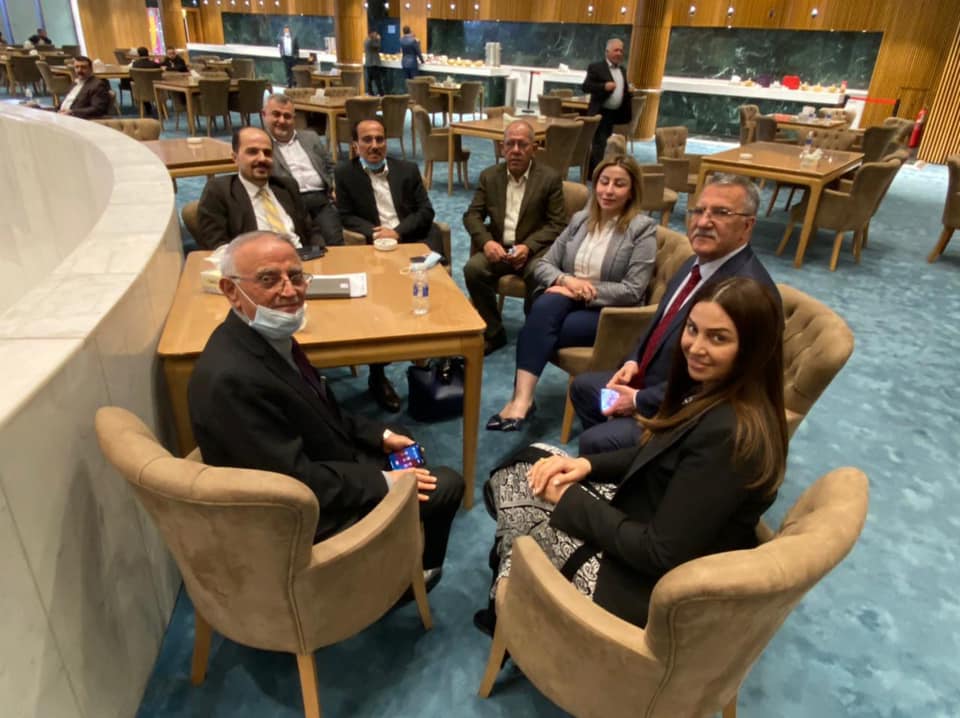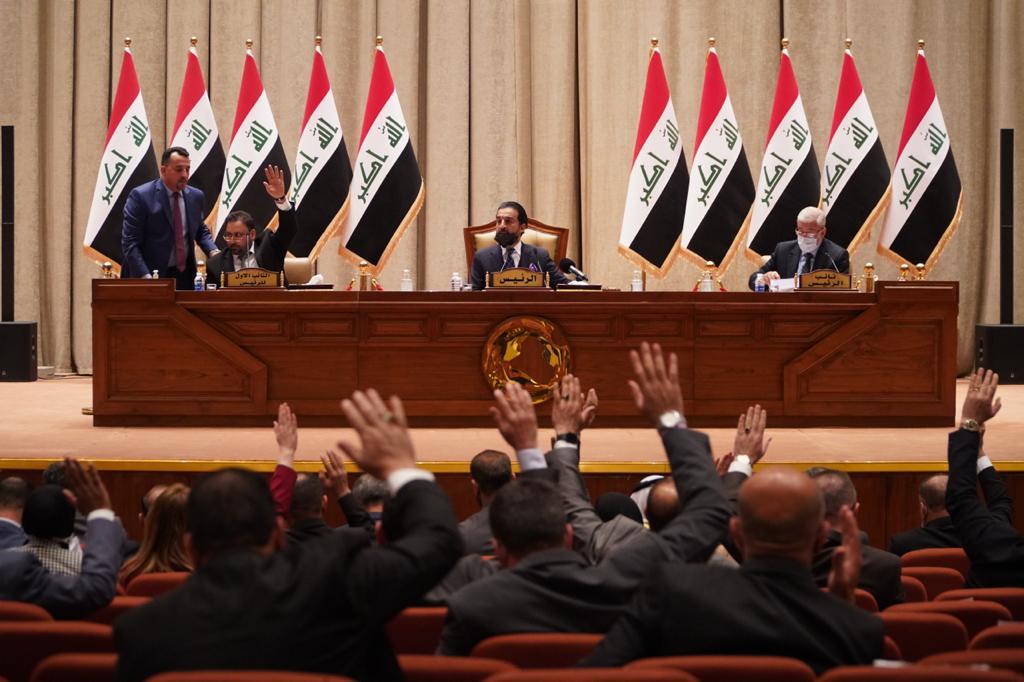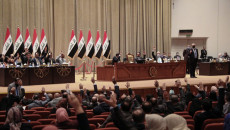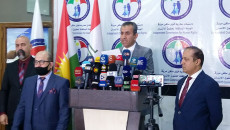At the end of the marathon, representatives of minorities in Iraqi house of representatives, the parliament, cheerfully entered the press media and from its platform, they declared victory of passing amendments to current Iraqi federal court law not the recently drafted which imposed Islamic jurists as members of the 11-judges supreme court.
“We express our pleasure for passing amendments to current Iraq’s federal court law,” said Yonadam Kanna, Christian member of Iraqi parliament in a press conference by Christian, Ezidi and Sabean MPs on March 18, following endorsement of amendments to Iraqi’s federal court law number 30 in 2005 after three controversial sessions.
“We express our pleasure for passing amendments to current Iraq’s federal court law,”
"I would like to hail and thank, on behalf of my colleagues all civil powers, civil society, unions and syndicates which consolidated with us against passing the new draft of the law. And we thank all the representatives who boycotted the session to avoid 2/3 quorum," Kanna added.
The Iraqi parliament passed an amendment to the 2005 Federal Court Act on Thursday to elect new members for the court which had not held meetings since last year as it could not meet quorum. The court is due to meet soon to overview parliamentary elections next October.
Religious minorities of Christians, Ezidis and Mandeans were successful that the session did not meet the quorum needed to vote on a recently drafted controversial bill that sought to grant veto rights to Shiite and Sunni Islamic jurists on the Supreme Federal Court.
A minimum two-thirds of the parliament has to vote to pass a new law, while amendments to existing legislation can be endorsed by attending majority. Kurdish, Christian, and Ezidi lawmakers boycotted Thursday’s parliamentary session as objection to the recently drafted law in support of amendments to currently vali law.
“The new law proposal was drafted in a hurry containing articles negatively reflecting on community texture,” Kanna said about the new law which failed to pass.
“The new law proposal was drafted in a hurry containing articles negatively reflecting on community texture,” Kanna said
Iraq's supreme federal court is the supreme judicial power in the country, a body independent from the government and the Supreme Judicial Council, authorized to dissolve disputes between the legislative and executive authorities, between ministries, the legitimacy of legislations, constitutional issues and the disputes pending between federal and regional governments.
Recently a member passed away and two were retired, pushing the need for an amendment to elect new members for the court that can receive objections to decrees issued by the three Iraqi presidencies: Iraqi president, prime minister and parliament speaker.
Footage of press conference by representatives of religious minorities in the Iraqi parliament on March 18, Baghdad.
The amendment guarantees representation of the minorities in the court. In 2005, a Christian judge and two Kurds along with Sunni and Shiite judges were members of the court.
“We managed to add an article that states all components of the Iraqi society to be represented in the court,” said MP Rehan Hanna Ayub, whom boycotted three successive session with her colleagues in protest of the new proposed draft.
“By this amendment, we preserved the civil state,” she added.
“By this amendment, we preserved the civil state,” she added.
Advocates of democracy and freedom debated for religious figures to join the court, Iraq is copying the Islamic state model of Iran, which is a blow to civil, free and democratic state according to the constitution approved in 2005, following the fall of Saddam totalitarian Sunni Arab regime that ruled Iraq with an iron fist for decades.
“Iraq is for all and we will accept only a civil state,” Aswan al-Kildani, a Christian MP told KirkukNow. Religious minorities were concerned that if Islamic jurists have the right of veto in the court, some verdicts might by unfair and non-negotiable since rulings by Iraq supreme federal court are final, binding and irrevocable, Kildani added.
Iraqi constitution states that only judges are entitled to run courts and no power above them except law.
“This has kept the state civil by refrain from proposal of clergies and law jurists and solely depending on judges,” said Ahmed Abbadi, legal expert. “The court could have become a point of conflict as there are more than an analysis by each sect for a single rule, leading to delay in issuing laws and legislations.”

Representative of minorities boycotted March 15 session about federal court law. Photo by MP Rehan Hanna.
During March 8th session, Iraqi parliament MPs endorsed all the articles of recently drafted federal court law except articles 2,3 and 12 due to objection of MPs representing the minorities.
Minorities mounted their efforts calling on fair and equal representation of all religions to pass a new federal court law.
Civil society activists criticized the proposal of religious figures to join the court as an attempt toward ethnic sectarianism considering Islam as one of the main sources of legislation in Iraq yet not the only source.
The court is the highest judicial body for constitutional disagreements and has addressed over 2,000 cases since its foundation in 2005.
Parliamentary blocs joined the Christians, Ezidis and Mandeans in standing against religious interference in the judiciary system.
“Victory of civil state came in result of harmony and public opinion pressure and activities that called for separation between state and religion,” a statement by Sunni Arab bloc National Dialogue Front led by Saleh al-Mutlag said.
“Iraqis are alive people and they will not pass attempts to impose the status quo,” it added.
“Iraqis are alive people and they will not pass attempts to impose the status quo,” it added.
Iraqi constitution regulates relations between components of Iraqi society. Item two of the constitution states that the identity of Iraq's majority is Islam and guarantees all the religious rights of all for freedom of doctrine and religious rituals for Christians, Ezidis and Mandeans.
Pro-Iran Shiite majority rule Iraq and nominate the prime minister while Sunni Arabs hold the position of Iraqi parliament speaker. Kurds in the north have an autonomous region and occupy the presidency of Iraq since 2007. The sectarian division in Iraq or what is called Muhasasa has become a role model for successive cabinets since 2005.
“We don’t want to be dealt with in superiority, to be marginalized or exempted as we are genuine citizens of this country,” Kanna added.







